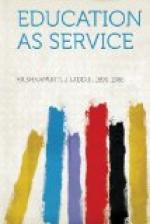My Master points out that by talking about a person’s faults, we not only strengthen those faults in him, but also fill our own minds with evil thoughts. There is only one way of really getting rid of our lower nature, and that is by strengthening the higher. And while it is the duty of the teacher to understand the weaknesses of those placed in his charge he must realise that he will destroy the lower nature only by surrounding the boy with his love, thus stimulating the higher and nobler qualities till there is no place left for the weaknesses. The more the teacher gossips about the faults of the boys, the more harm he does, and, except during a consultation with his fellow teachers as to the best methods of helping individual boys out of their weaknesses, he should never talk about a boy’s defects.
The boys must also be taught the cruelty of gossip among themselves. I know many a boy whose life at school has been made miserable because his companions have been thoughtless and unkind, and the teacher either has not noticed his unhappiness, or has not understood how to explain to the boys the nature of the harm they were doing. Boys frequently take hold of some peculiarity in speech or in dress, or of some mistake which has been made, and, not realising the pain they cause, carelessly torture their unfortunate schoolfellow with unkind allusions. In this case the mischief is due chiefly to ignorance, and if the teacher has influence over the boys, and gently explains to them what pain they are giving they will quickly stop.
They must be taught, too, that nothing which causes suffering or annoyance to another can ever be the right thing to do, nor can it ever be amusing to any right-minded boy. Some children seem to find pleasure in teasing or annoying others, but that is only because they are ignorant. When they understand, they will never again be so unbrotherly.
In every class-room these words of my Master should be put up in a prominent place: “Never speak ill of any one; refuse to listen when anyone else speaks ill of another, but gently say: ’Perhaps this is not true, and even if it is, it is kinder not to speak of it.’”
There are crimes against love which are not recognised as crimes, and which are unfortunately very common. A teacher must use discretion in dealing with these, but should teach a doctrine of love so far as he is permitted, and may at least set a good example himself. Three of these are put by my Master under the head of cruelties caused by superstition.
1. Animal sacrifice. Among civilised nations this is now found only in India, and is tending to disappear even there. Parents and teachers should tell their boys that no custom which is cruel is really part of any true religion. For we have seen that religion teaches unity, and therefore kindness and gentleness to everything that feels. God cannot therefore be served by cruelty and the killing of helpless creatures. If Indian boys learn this lesson of love in school they will, when they become men, put an end entirely to this cruel superstition.




